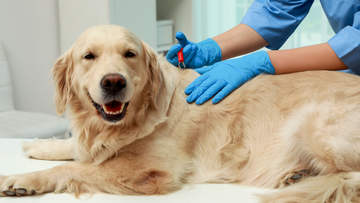Nutrient deficiencies in pets
These days, it's almost a given that we humans consume certain nutrients in addition to our daily diet. Although the range of foods available today is more diverse than ever before, the problem of steadily declining nutrient levels in fruit and vegetables is well known. Mass production and monocultures are depleting the soil, and fruit, vegetables, and even animals are being bred at an unnaturally rapid rate solely for profit, which further exacerbates the problem. And if humans supplement nutrients and vital substances, why shouldn't it make sense for our pets too? They, too, often don't get enough nutrients from meat, fruit, and vegetables.
Food as medicine for humans and animals
"Let food be thy medicine and medicine be thy food" – Hippocrates already had this insight more than 2,000 years ago, and it is more relevant today than ever. People are becoming increasingly aware that what they put into their bodies has a significant influence on their health and well-being. Health is no longer taken for granted, and the focus is increasingly on prevention and a healthy lifestyle. Orthomolecular medicine, for example, aims to keep the body in balance through the targeted administration of orthomolecular substances. For this reason, many alternative veterinary practitioners also work with companion animals using this approach in combination with other alternative methods – including Michaela Wegner in northern Germany. The examples from her practice show the diverse ways in which supplemental nutrients can make a significant difference to the lives of dogs, cats, and horses.
From the everyday life of Michaela Wegner in veterinary practice
For 25 years now, I've been working as a veterinary alternative practitioner with a mobile practice for dogs and horses in Northern Germany. What I'm increasingly observing in my patients are deficiencies in various nutrients that can negatively impact the organism and quality of life of our four-legged friends, or even lead to illness. This is largely due to the diet, which – like our food – is often heavily processed and therefore of insufficient nutritional quality. However, the right nutrients in sufficient quantities are essential for animal health: They ensure optimal metabolism, support skin and intestinal function, and promote detoxification via the liver and kidneys.
Targeted supplementation based on analyses
However, adding nutrients in a scattergun approach is pointless and ineffective. That's why I work with a system in my practice that shows me the animal's deficiencies in detail. My credo: Analyze first, then supplement. We always begin with a detailed initial medical history and a precise assessment of the animal's current nutritional status. After developing an individualized treatment plan tailored precisely to the animal's needs, we begin with targeted supplemental nutrient intake—and this is where Nikolaus Nature's products come into play. For more than 20 years, orthomolecular nutrient combinations have been part of my standard repertoire in my practice—because their naturalness means they have high bioavailability and can therefore be used very specifically. And the many successes I've achieved time and again with my four-legged patients speak for themselves and never cease to fascinate me.
An example from my practice with HEPAGURAD Dog®
Lena is a terrier mix, approximately 10 years old. Her owner scheduled an appointment with me because Lena's coat had been dull and greasy for some time. In addition, painful calluses had formed on her elbows, her hip joints cracked audibly whenever she moved, and I also diagnosed advanced periodontal disease. After the initial thorough examination, we began a so-called "cleansing regimen" for her entire organism using the HEPAGURAD Dog® supplement from Nikolaus Nature—a powerful nutrient mix that supports the detoxification organs.
After just 10 days, we noticed astonishing changes in Lena. Her periodontal disease had receded, her joint cracking was significantly less severe, and fur had begun to grow back on the calluses. Her hair became shinier and felt noticeably less frizzy. Cases like this always make it clear to me that the real cause of many external symptoms lies in overloading the liver, kidneys, or intestines.
“It gives me great pleasure to see that such good results can be achieved with gentle and very effective means.” (Michaela Wegner)
My recommendation for patients in my practice
For my four-legged clients, I recommend a twice-yearly four-week course of HEPAGURAD Dog® treatment. The ingredients specifically support the liver and its detoxification processes—regular treatment can help reduce the buildup of toxins that ultimately need to be excreted through the skin and cause problems.
For dogs that regularly have to contend with pests and parasites from both inside and out, I recommend IMUN Dog® 'Para'. It supports intestinal health, so that helminths and germs encounter an unfavorable breeding ground and cannot spread. These then move on to other hosts—should they even be able to do so at all. A healthy balance in the intestine promotes liver and kidney function, creating a metabolic environment unfriendly to fleas and ticks. The best time to administer IMUN Dog® 'Para' is before the pest season begins in spring and fall, to best prepare the organism.
"It's also particularly important to me that I work with veterinarians, physiotherapists, osteopaths, and other animal health practitioners. Conventional medical treatment can be meaningfully supported by naturopathic medicine and offers good preventative measures, for example, against certain diseases and for regeneration after long-term antibiotic and cortisone treatment." (Michaela Wegner)
About Michaela Wegner
Michaela Wegner has been a veterinary naturopath since 1998 and runs a mobile practice for large and small animals in Schleswig-Holstein, Mecklenburg-Western Pomerania, and Hamburg. This allows her to examine the animals in their familiar environment, which reduces stress for the four-legged patients and allows for a more accurate assessment of their condition. Her focus is on causal research and treatment using regulatory diagnostics, laser acupuncture, homeopathy, leech therapy, and phytotherapy. She completed her veterinary practice studies at the DPS and ATM in Hamburg, as well as a degree in human medicine.
“I have made it my mission to support animals in healing, regenerating, and maintaining their health.” (Michaela Wegner)






